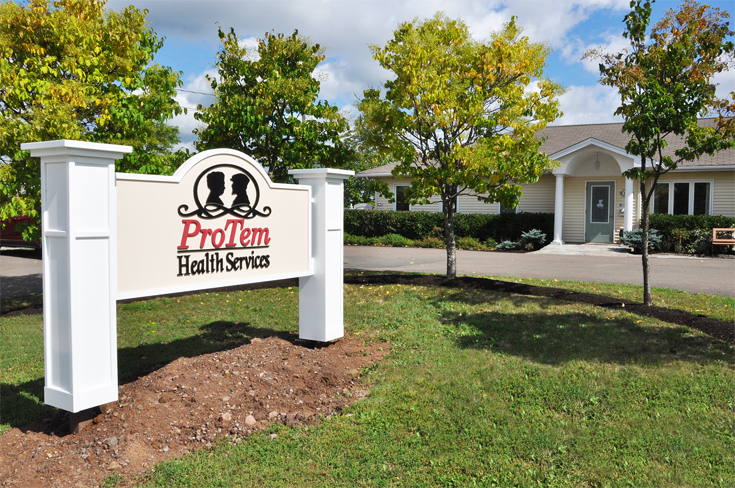About Dementia
Learn about the different types of memory diseases we specialize in at ProTem.
Alzheimer’s Disease
You know, as you get older, your body follows suit…have you noticed…? While you might even get plastic surgery for the lines on your face, you can’t hide the thinning skin on your hands and arms.
You know your eyes have probably lost some ground since you passed the 40 mark… and if you’re past 50, odds say you’re likely wearing glasses by now. Because eyes age.
And on top of that…your hair may have thinned a bit, you may have just a hint of a pooch near your belt, and your blood pressure may be raising its ugly head.
To the casual observer, all these things are signs of aging.
Aging is inescapable. It’s a fact of life. It reminds us that our days are limited, and we’re mortal.
There’s another symptom that’s often joked about as if it’s also a natural part of aging.
Dementia.
Dementia isn’t a part of aging. But for some people it follows aging’s course. It’s any one of a group of diseases that cause damage in the brain. Some of these diseases happen to older people, but some can affect those in early adulthood. It’s important to identify the symptoms, see your doctor, and get treatment as early as possible.
Serious and Permanent Changes in the Brain
When you’re the one who can’t seem to remember your grandchildren’s names, or what keys are for, or your own birthday…. well, the frustration is suffocating. And it’s no joke.
Changes are taking place in your brain that are serious, debilitating, and permanent. There’s no cure for Alzheimer’s.
What is Alzheimer’s, Anyway?
Alzheimer’s is a form of dementia that causes severe problems with memory, behavior, and thinking. It’s the most common form of dementia, and is believed to be responsible for roughly 60-80% of dementia cases.
This is a progressive brain disorder that damages brain cells, and eventually destroys them. Dr. Alois Alzheimer originally identified the changes in the cerebral cortex. He showed that it was thinner than normal, that there were deposits of “senile plaque” he had previously only seen in elderly people, but found the same in a woman in her early 50’s.
He also identified neurofibrillary tangles…or in simpler language, tangles of tau protein fibers. These are located inside the brain cell and the amyloid plaques are found in between the cells.
The “senile plaques” he described are amyloid plaques that accumulate between the nerve cells in the brain. Amyloids are protein fragments that a healthy brain can’ dispose of, but in Alzheimer’s they accumulate and form hard plaques.
Amyloid plaques along with neurofibrillary tangles are two hallmarks of brain changes in Alzheimer’s disease.
Here are some signs and symptoms of Alzheimer’s disease, which is the most common dementia diagnosis:
- Loss of memory so severe, it disrupts your daily life. Forgetting dates, events, appointments. Things that you recently learned, as opposed to birthdays you’ve known all your life. Those memories go later.
- Difficulty following a plan, or a familiar recipe, or managing bills. Having difficulty driving to a familiar place, managing tasks at work, or how to do laundry.
- Forgetting where you are or how you got there. Difficulty understanding a concept like, “next week” or “two months ago” because the only clear time and place is “here” and “now.”
- Visual confusion. Difficulty understanding visuals, judging distance, color, and contrast between light and dark and colors. All of these things can wreak havoc while driving.
- Difficulty with conversation because it’s hard to join in, and hard to follow. Remembering the word for something or using the wrong word altogether, or just stopping in the middle of a sentence and having no idea what they were saying or how to get back to it. This is far more severe than losing one’s train of thought. Repeating themselves over and over, not realizing they’ve already said something.
- Losing or misplacing belongings and unable to retrace steps to find them. Because they often put things in unusual places, then don’t remember where, anxiety builds. Anxiety over losses and accusing others of stealing. This is likely to happen more and more often over time.
- Waning judgment. Decisions become more and more difficult. Managing money becomes very difficult as a result. Giving away large amounts of money, or losing it. Poor decision making. Decline in personal hygiene.
- Withdrawal from former interests, hobbies, social activities. Sensing the changes within themselves, they may be less comfortable in social environments. Find more security in the familiarity of home.
- Mood and personality changes because of distinct changes in the brain. Confusion, suspicion, anxiety, fear, depression. Just feeling insecure away from their home and room, or favorite chair.
Aging is a vital and important part of the life cycle, when the scattered busy family slows down a bit, and often comes together to offer support and enjoy each other. And while dementia isn’t a natural part of aging, for some people it does come at the same time.
If your loved one experiences changes like any of these, you would not be overreacting to get them an appointment with the doctor. If there are real symptoms like these developing, it’s far better to find out there’s nothing to be concerned about, than to miss the chance for early treatment if Alzheimer’s is emerging.
The earlier the better. There are medications that can slow the process and improve cognition if caught in the earliest stages.
And don’t hesitate to call us to talk about your concerns. We may be able to answer some of your questions, direct you to outstanding resources, or just provide a sounding board. We work everyday with dementia care in Moncton NB.
We want to help. That’s what we’re here for.
Call 506.874.9652 or send us a note here.
Contact Us
Visit us at:
71 Gorge Road
Moncton, NB E1G 1E5
Mailing address:
Box 4-120, 331 Elmwood Drive
Moncton, NB E1A 1X6
Telephone: 506.874.9652
Our five small homes are located in the Mapleton area of Moncton.
Sign Up for Our Newsletter




